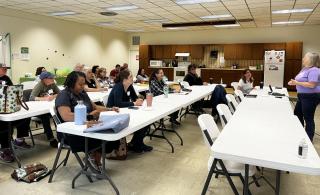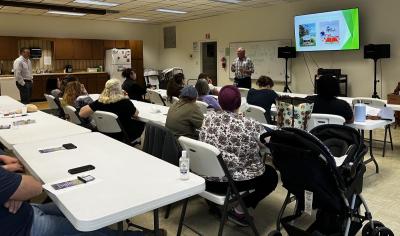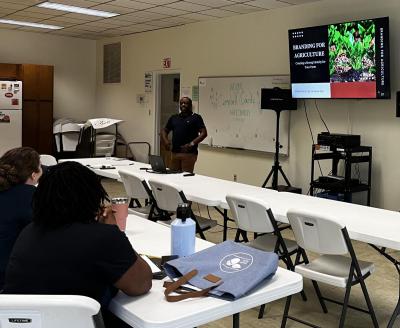Agritourism Workshop Provides Practical Advice to Local Farmers

On February 23, 2023, the Campbell County Agritourism Workshop, co-hosted by the Economic Development and Extension Offices attracted farmers from Campbell, Bedford, Halifax, and Charlotte Counties, looking to learn more about the ins and outs of Agritourism. The event was designed as an introduction to Agritourism as a way for farmers to diversify their farm’s income by making the most of using the resources they already have.
In 2021, tourism in Campbell County accounted for $112 million in visitor spending and with agriculturally-zoned property occupying the vast majority of land in the County, agritourism presents a valuable opportunity for local residents.
Stories from the Front Lines of Agritourism
Presentations from Economic Development, Zoning and Community Development, and the Small Business Development Center-Lynchburg Region were augmented by guest speakers from Appomattox County’s Evergreen Lavender Farm and Campbell County’s Yoders Farm, who were able to provide real world advice as experienced agritourism hosts.
Bonnie Swanson from Evergreen Lavender Farm described how she began small offering cut your own opportunities for visitors and then having some already pre-cut, and expanding into making lavender products. Now she makes lotions, shampoos, soaps, essential oils, culinary herb packets and more. She even offers lavender ice cream, made to order by Outside the Cone in Lynchburg, showcasing how partnering with other small business owners can create the synergy to increase both business’ bottom lines.
 Delvin Yoder of Yoders Farm in Campbell County discussed how his agritourism journey began with a serendipitous interaction with Campbell County Extension Agent Todd Scott about a grant for berry picking which helped to get his farm started in pick-your-own strawberries. Extension agent Todd Scott joined Mr. Yoder to talk about the process and how Extension was able to coordinate with the farm to secure the grant. Mr. Yoder also spoke about how the skills of different family members all contribute to the success of the agritourism attraction. One son helps out with farming side, while another more technology inclined son supports the social media side of business promotion. Mr. Yoder’s wife Barbara uses her skills in creating value-added products, jams and sauces made with farm produce, which they also sell in their on-farm shop.
Delvin Yoder of Yoders Farm in Campbell County discussed how his agritourism journey began with a serendipitous interaction with Campbell County Extension Agent Todd Scott about a grant for berry picking which helped to get his farm started in pick-your-own strawberries. Extension agent Todd Scott joined Mr. Yoder to talk about the process and how Extension was able to coordinate with the farm to secure the grant. Mr. Yoder also spoke about how the skills of different family members all contribute to the success of the agritourism attraction. One son helps out with farming side, while another more technology inclined son supports the social media side of business promotion. Mr. Yoder’s wife Barbara uses her skills in creating value-added products, jams and sauces made with farm produce, which they also sell in their on-farm shop.
Both Swanson and Yoder emphasized that it’s important to remember that you need to be a “people person” to pursue this course for your farm. Agritourism is tourism and that is a “people” business.
Special Use Zoning and Special Permits and Farm Exemptions
Austin Mitchell, Campbell County’s Zoning and Subdivision Administrator covered the necessary preparations that are needed (and sometimes not needed) to start off any agritourism pursuits while maintaining compliance with the County’s zoning definitions. He covered the basics of what is and isn’t included under the Agriculturally-Zone rules. Economic Development provided a handout for attendees with over 50 activities that farmers can consider when thinking what kind of agritourism attractions they might be best suited to pursue. Each of these ideas were sorted by what kind of permitting would be needed, if any. The end of Mitchell’s presentation included an interactive list of scenarios which let the attendees talk through whether the scenario would be allowed under the Agricultural Zoning rules as an agricultural activity or whether the farmers in the scenario would need to have their zoning amended or even if they needed to go through the process of a special event permit with County Administration. The extended discussions that followed reflected how carefully the attendees were listening and how much of the information was accessible and being absorbed by the group.
The Importance of Branding and Marketing Your Farm
Branding and marketing expert Jawanza Hall, a counselor at the Small Business Development Center-Lynchburg Region, walked through a series of steps farms can take to help them stand out from the crowd. He encouraged the farmers to think about what makes their farms unique and to build on their personal farming experiences to make an online presence that focuses on the results visitors will get from their on-farm experience. Hall and SBDC-Lynchburg Region Executive Director Stephanie Keener reminded their audience that agribusinesses are welcome to take advantage of the free classes, counseling, and other support the SBDC offers to help small businesses grow.
Growing a Farming Network
Farmers in attendance introduced themselves, told a bit about what their farm produced and what they hoped to get out of the workshop. There were a wide variety of farm products represented, reflecting the impressive diversity in farm products grown and raised in Central Virginia. Just this small cross section included chickens, ducks, eggs, pecans, soybeans, herbs, and a few new farmers looking for a perfect niche. During the break, many engaged in conversations, trading tips and stories.
With the success of this workshop, Economic Development plans to continue to coordinate with the Extension Office to provide agribusiness support. Economic Development welcomes feedback from attendees as well as interested members of the public on possible topics for future workshop through an online survey.
NEXT UP: Campbell County Farmers Market Interest Meeting on March 8th
A Campbell County Farmers Market interest meeting will be held March 8th at 4:00pm in the Agriculture building meeting room. Farmers from both Campbell and all surrounding areas, are invited to meet with market managers to coordinate scheduling, sign up as vendors for the season, and network with other farmers. Any farmers market managers in the County are encouraged to come and meet the farmers and remember to bring any vendor forms the farmers would need to complete.

